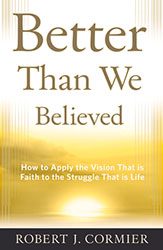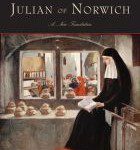 I am very appreciative of Robert J. Cormier’s Better Than We Believed (now featured at the Patheos Book Club). Cormier sees faith as a vision which shapes how we understand the events of our lives. Doctrines and dogmas are important, but derivative and somewhat relative in the living of our daily lives. While they may have a place in our faith, polarizing viewpoints on issues such as paper (scriptural) or papal infallibility, abortion, the virgin birth, science and religion, and the timing of second coming, are secondary and relativized in the living of our lives. They are important, but faith comes first. Faith is about experiencing and trusting a vision that bears fruit in our daily lives, helping us find healing, hope, reconciliation, and meaning.
I am very appreciative of Robert J. Cormier’s Better Than We Believed (now featured at the Patheos Book Club). Cormier sees faith as a vision which shapes how we understand the events of our lives. Doctrines and dogmas are important, but derivative and somewhat relative in the living of our daily lives. While they may have a place in our faith, polarizing viewpoints on issues such as paper (scriptural) or papal infallibility, abortion, the virgin birth, science and religion, and the timing of second coming, are secondary and relativized in the living of our lives. They are important, but faith comes first. Faith is about experiencing and trusting a vision that bears fruit in our daily lives, helping us find healing, hope, reconciliation, and meaning.
For many years, I have written that theological and faith formation – similar to Cormier’s understanding of faith – are ultimately about the interplay of vision, promise, and practice.
Vision involves how we experience the world: the landscape of reality involving our images of God, suffering and evil, power, human agency, and hope. Our vision is our fluid, evolving, and growing image of the ultimate realities of our lives. Promise expresses the warrant that these visions can be experienced in daily life, albeit often dimly as the Apostle Paul asserts. Practices are the daily disciplines or activities that enable us to experience our vision more clearly in daily life and crisis situations. For example, our practices might involve prayer, meditation, devotional reading, visualization and holy reading, and mission-oriented activities. Our practices enable our vision to become a living word, given flesh in what Cormier calls “the struggle that is life.”
Cormier sees our heavenly future as one of the motivating principles of a meaningful life. Our destiny shapes our pathways. Accordingly, we are challenged to live our daily lives “on earth as it is in heaven.” Cormier asserts that “faith in heaven frees us from the dread of death, or the need to run around – keep ourselves distracted – because we cannot face the facts of life.” Spirituality deals with the “unfixables,” as one spiritual teacher has noted, but in light of our heavenly destination, we can live gracefully with what is beyond our power while acting decisively in relationship to what is within our power. According to Cormier, God made us to grow into heavenly beings who are destined to live with God forever. Heaven is our personal perfection aimed at in this world and the next.
Contrary to some critics, heaven is not otherworldly; in fact, we can be both heavenly minded and earthly good. As I ponder heaven, I take slightly different pathway from Cormier. While heaven may be our destination, in terms of God’s care, heaven is not better than earth; it is simply different. If we image God as omnipresent and omniactive, then every place is heavenly, the earth is filled with the glory of God, as the prophet Isaiah discovers. Earth is chock-full of divinity. God is as fully here as in heaven. The challenge is that we asleep to our divine destiny and thus create all sorts of personal, interpersonal, and corporate situations that hide our heavenly reality. As a Bach chorale proclaims, “sleepers awake.” Or as Jesus proclaimed, the realm of God is here, in this body, in food and in drink, in radical hospitality, in feast where all creation rejoices.
Cormier’s image of us being heavenly persons in the making and my image of the heavenly-here-and-now ultimately shape similar practices and ethics. This world is where we wake up, where we God in ourselves and in others. This world is where we treat ourselves as God’s beloved children, working out our wholeness with fear and trembling and awe and excitement.
As I write this review, I’m listening to Christmas Carols. The story of Christmas is the proclamation of heaven on earth. A child is born, not supernaturally, or an exception to the interdependence of life, but the fulfillment of what we can be. As early church theologians affirmed, Christ became human so that we might become divine. This divinization is the calling of heaven on earth as Christ is born in us and becomes our deepest reality and the lenses through which we see others.
We can “practice heaven” in the here and now. We can see halos in ordinary moments, discover Christ in our children and grandchildren, support the holiness of the marginalized and vulnerable, and love the Christ within us in all of her or his beauty. We do this by vision – withdrawing in contemplation and then praying with our eyes open, learning to see God in all things and all things in God. With Blake, our doors of perception become thresholds of divinity, seeing all things as they are, infinite and loved by God, in this great heavenly-here. Our lives, then, become “better than we believed.”













